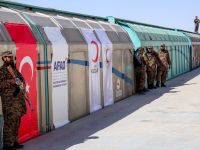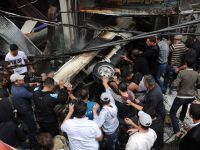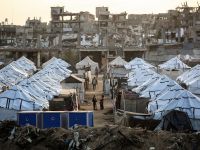By Jihad Abu Falah -
Baghdad
A senior Iraqi official has said that his country “will fight all plans that seek to settle the Palestinian refugees outside their homeland,” and that Iraq will not concede to such plots, or make peace with Israel, in return for lifting the sanctions off Iraq.
Saad Qassem Hamoudi, head of the Popular Committees and former deputy speaker of the Iraqi parliament, said in an interview with Albawaba.com that the US will not allow any Arab country to possess an advanced military arsenal. On the contrary, he said, it will work to destroy the Arab economic and military capabilities.
Following are excerpts of the interview:
Q: What is your view of flights into Baghdad by Arab delegations?
A: These flights fall in the context of breaking the siege [on Iraq] and they convey a clear political message to the powerful countries that still impose the decade-old unjust embargo on Iraq.
These flights are an expression of our Arab brethren’s support for Iraq in the face of the US hegemony that is responsible for the suffering of the Iraqis. The US and Britain must learn their lesson after these flights and they should act wisely and end the embargo crime against Iraq.
Q: These sanction-busting flights started only three months ago, why now, particularly after the outbreak of the Intifada?
Iraqi people have always laid a bet on the pan-nationalist sense of the Arab people, who stood to the side of Iraq from the very beginning of Allies aggression led by the US and Britain.
The Arabs have not spared any means to help lift the sanctions off Iraq. Arab delegations have always expressed such a stand similar to the recent flights which challenged the air embargo. These flights are illegitimate only in the eyes of the US.
The Iraqis are aware of the fact that all the Arabs believe in the common goals and destiny of the Arab nations, and it is not surprising that some Palestinian children held up photos for President Saddam Hussein and the Iraqi flag during their confrontations with the Israeli forces.
Iraq will stand on the side of the Palestinians until they liberate their homeland, and the position of the Iraqi government is that we will share our bread and medicine with the Palestinians. The government, responding to a directive by President Saddam, has asked the UN to allocate a certain percentage of the oil-for-food revenues to the Palestinian people. For the Iraqis, defending Jerusalem is defending Moussel and Baghdad, and that’s why seven million young Iraqis have come forward and volunteered to fight the Israeli occupation.
What we do to support the Arab issues, and particularly the Palestinian issue, is part of the national duties that all Arabs must fulfill.
The Palestinian are doing the Arabs a favor by returning to them part of their lost dignity by sacrificing blood.
The Americans have to realize that their hostile and biased policies regarding the region leads to instability.
The US imposes the siege on Iraq under the cover of international legitimacy, and Israel commits its crimes against the Palestinian under the same cover. Therefore the issues of Iraq and Palestine are one issue, and so related that the US now realizes that the Intifada has resulted in a state of suppressed anger among the Arab in the street; the US is worried about its interests in the region.
Q: There has been talk of a deal by which the sanctions would be lifted in return for Iraq’s participation in the peace process, recognition of Israel, and the settlement of Palestinian refugees in Iraq. What do you have to say about this?
A: No one has suggested the plan of settling Palestinian refugees in Iraq and we would not allow any to do so. We support the right of return for the Palestinian refugees and condemn any attempt by any Arab country to accept refugees as permanent residents.
However, an envoy of Pope John Paul II has proposed in a meeting with President Saddam Hussein a plan that links the lifting of sanctions with the settlement of Palestinian refugees in Iraq. The president’s response was to reject the proposal and dismiss the envoy.
Meanwhile, many Arab and International parties have suggested that we become part of the peace process and recognize the occupation in return for removing the sanctions but our answer was no, and will remain so until the Palestinians achieve their independent state on their fully liberated national soil.
We will not bargain over the Palestinian blood in return for lifting the embargo, and we will work for the liberation of Palestine. For us, both the Palestinian and the Iraqi issues are one cause, and the US is our mutual enemy. The American attack on Iraq in 1990, and the following sanctions, were unquestionably aimed at destroying the advanced military capabilities and the huge army of Iraq that brought about a change in the balance of military power in the region. The US wanted the military balance to remain in favor of Israel.
© 2000 Al Bawaba (www.albawaba.com)







